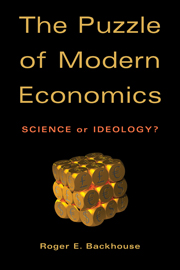PART III - EVALUATION
Published online by Cambridge University Press: 05 June 2012
Summary
Running through all the four chapters in Part II are questions of methodology. What does it mean to be scientific in economics or, to put the question differently, how can economic inquiry best be carried out? The abstract theories and elaborate statistical methods that have been the butt of so much criticism were the result of economists' having attempted to construct a rigorous scientific economics. Given the mixed record of success and failure revealed in Part I, what lessons can be drawn? Rather than answer this question by proposing a new methodology that will solve these problems, Chapter 10 suggests that the value of formal theory may not lie in presenting a view of how the world must work but in continually questioning our presuppositions about how the economic world operates. This offers a path between complete scepticism about economic theory and formal econometric methods and uncritical acceptance of the reigning orthodoxies. To support this case, the chapter starts with an exploration of the different ways in which economic knowledge can be created.
- Type
- Chapter
- Information
- The Puzzle of Modern EconomicsScience or Ideology?, pp. 165 - 166Publisher: Cambridge University PressPrint publication year: 2010



